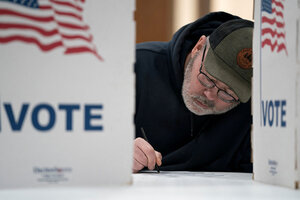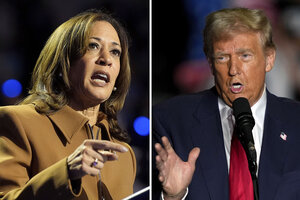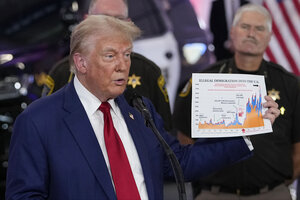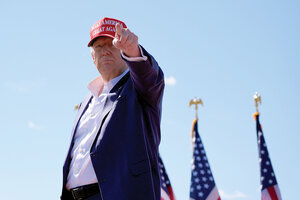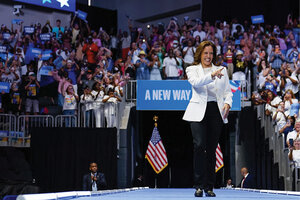Vance shows polish, Walz hits him on Jan. 6 in notably civil VP debate
| Washington
Ohio Sen. JD Vance showed he was the more deft debater when he met Minnesota Gov. Tim Walz onstage for their vice presidential debate Tuesday night, with both candidates taking a much more civil approach than their running mates did onstage last month.
Senator Vance showed a level of polish and empathy onstage that was notably different from his standard political persona, looking to find humanizing moments throughout the evening.
Governor Walz started off haltingly and was the less polished of the two, stumbling over a few points, missing some opportunities to go on offense, and misspeaking a handful of times. That includes saying at one point that he’d “become friends with school shooters” when he seemingly meant that he’d befriended survivors of school shootings – comments the Trump campaign immediately jumped on with attacks.
Why We Wrote This
JD Vance used the U.S. vice presidential debate to show an empathetic side. Tim Walz called out Mr. Vance for avoiding a question on the 2020 election outcome. Both showed a level of civility now rare in national politics.
But while Mr. Walz didn’t go on the offensive as often, he landed a hard punch at the end of the debate, flaying Mr. Vance for ducking an answer on whether he thought former President Donald Trump had lost the 2020 election.
Vice presidential debates almost never influence the final outcome of a presidential election – few undecided voters watch the undercard debate – and while there were some stumbles, there were no missteps major enough to live on and haunt their running mates. But the debate, hosted by CBS News in New York, still offered some illuminating moments about the race. Here are three key takeaways.
Vance and Walz largely stuck to policy and stayed civil
Compared with the past few debates, this was a lovefest.
After a June debate where Mr. Trump repeatedly eviscerated President Joe Biden, and a September debate where Vice President Kamala Harris repeatedly baited Mr. Trump into overheated attacks, this one took a remarkably civil tone between the two Midwestern candidates.
Mr. Vance struck a sharply different tone than he’d regularly displayed earlier in his political career, leaning into empathy and looking to agree with Mr. Walz as often as possible. His harsh past rhetoric has hurt his image badly with voters – polls show he’s less popular than Mr. Walz, former President Donald Trump, and Vice President Kamala Harris – but on the national stage, he sounded remarkably different.
Mr. Walz and Mr. Vance repeatedly said they agreed on issues and offered each other the benefit of the doubt. Mr. Walz said he believed Mr. Vance was sincere when he said he believes kids shouldn’t face gun violence. And he agreed with Mr. Vance’s criticism of outsourcing. “The rhetoric is good. Much of what the senator said right there, I’m in agreement with him on this,” he said after Mr. Vance talked about how globalization had hurt middle America.
After Mr. Walz told a story of his son witnessing a shooting, Mr. Vance took a moment to offer his condolences: “Tim, I didn't know that your 17-year-old witnessed a shooting. I'm sorry about that. Christ have mercy. It is awful.”
“I've enjoyed tonight's debate, and I think there was a lot of commonality here,” Mr. Walz said near the end of the evening.
Both candidates punched up
While the two men took a notably friendly tone toward one another, they both took some hard shots at the top of the other ticket – the people Americans are actually choosing between to be president.
Mr. Walz blasted Mr. Trump for having called global warming a “hoax” and for pulling out of the Iran nuclear deal, as well as for promising to cut taxes for wealthy people. He also slammed Mr. Trump for convincing congressional Republicans to oppose a bipartisan Senate bill that would have cracked down on border crossings and provided a lot of money for border security.
Mr. Vance repeatedly questioned why Ms. Harris hadn’t actually taken care of her policy proposals while she was vice president. “Day 1 was 1,400 days ago,” he said at one point. “If Kamala Harris has such great plans for how to address middle class problems she ought to do them now, not when she’s asking for a promotion,” he said at another. He also slammed Ms. Harris for the Biden-Harris administration rescinding many of Mr. Trump’s border policies.
Vance dodged a number of questions. (Walz did too.)
Mr. Vance repeatedly sidestepped when asked about his previous rhetoric. He dodged when asked about pushing the conspiracy theory that Haitian refugees in Springfield, Ohio, had eaten their neighbors’ pets, pivoting to a reality-based argument that those immigrants were straining local resources.
Mr. Vance also pivoted when asked why he’d said in a private 2020 conversation that Mr. Trump had “utterly failed” to pursue populist economic policies during his presidency, claiming that he was actually criticizing Congress, not Trump, for not doing more on issues like tariffs.
And he claimed that “When Obamacare was crushing under the weight of its own regulatory burden and health care costs, Donald Trump could have destroyed the program,” but instead chose to work across the aisle to save it. Mr. Trump notably tried to repeal that program, as Mr. Walz pointed out. Mr. Vance also said that he didn’t support a national abortion ban, even though he said during his 2022 Senate run that he supported some national restrictions and signaled support for a 15-week federal abortion ban.
Mr. Walz also obfuscated, delivering a borderline incoherent answer when asked about why he’d incorrectly claimed he was in Hong Kong during China’s crackdown on student protesters in Tiananmen Square in 1989, before admitting that he was sometimes a “knucklehead” who misspoke.
But one of the more striking moments of the debate – and one of Mr. Walz’s best – came at the end. He slammed Mr. Vance for refusing to say Mr. Trump had lost the 2020 election. Mr. Vance dodged, saying he was “focused on the future.” “That is a damning non-answer,” Mr. Walz said.










